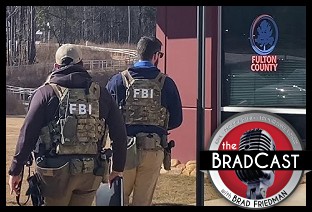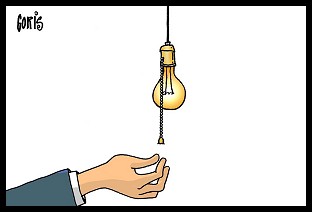 We've got several pieces of important news, on today's BradCast, regarding the long federal court challenge against Georgia's 100% unverifiable touchscreen voting systems, the new, similarly unverifiable touchscreen systems they plan to move to before the 2020 elections, and a hope from one of the plaintiffs that the case could result in all such systems --- now being adopted by states and counties across the nation before 2020 --- being declared unconstitutional for use in American elections. [Audio link to show follows below.]
We've got several pieces of important news, on today's BradCast, regarding the long federal court challenge against Georgia's 100% unverifiable touchscreen voting systems, the new, similarly unverifiable touchscreen systems they plan to move to before the 2020 elections, and a hope from one of the plaintiffs that the case could result in all such systems --- now being adopted by states and counties across the nation before 2020 --- being declared unconstitutional for use in American elections. [Audio link to show follows below.]
But first up today, a few words about stochastic terrorism from the President of the United States (also see this chilling editorial cartoon from our collection this week), as his appalling attacks on minority Democratic members of Congress continued with a new target over the weekend, and as another mass shooting --- this time at a food festival in Gilroy, CA on Sunday night --- is once again tied to white supremacy.
Then, we're joined by MARILYN MARKS of the Coalition for Good Governance for some of the at-times jaw-dropping news from a marathon hearing in federal court last Thursday and Friday in Atlanta. Marks' Coalition is a plaintiff in the case hoping to sideline Georgia's nearly 20-year old Diebold touchscreen voting systems in favor of hand-marked paper ballots before this fall's municipal elections and beyond, including the 2020 Presidential primary and general elections.
Marks shares a number of remarkable updates in the case we've been following since she filed it back in 2017. The updates include new details on the state actually destroying evidence --- including computer servers, databases and voting system memory cards --- needed in the case, and lies told to the court by the defendants about security issues related to the voting system. The misleading statements came from the office of Georgia's Republican Sec. of State Brad Raffensberger and the state's former GOP Sec. of State Brian Kemp. Kemp is now Governor of the state, after he is said to have narrowly defeated popular Democrat Stacey Abrams last November on the very same unverifiable computer voting systems overseen at the time by then SoS Kemp.
Marks details the extraordinary security measures plaintiffs were forced to undergo in order to have their experts even partially examine the ballot database used by Georgia which, the state had claimed, included customized, "super-secret" security measures built in to the system that made it completely different from identical --- and completely hackable --- Diebold touchscreen systems used elsewhere in the country. As it turns out, after spending thousands of dollars to create secure "clean rooms" at Georgia's insistence to allow plaintiffs' experts to examine the databases in two different locations (Michigan and Washington, D.C.) those experts found there was, in fact, no special customized "super-secret" security measures. The database structures are identical to those found available for download on the Internet --- from many different states --- going back as early as 2002, when Georgia first adopted their current, easily-manipulated voting systems.
"Let's be clear that we've still not had a chance to look at the system or the programming in the voting machines or the servers," she told me. "We were allowed to look at a database that is used to program the memory cards, just one tiny piece. There was a huge fight because the state lied to the judge, and lied to us, and said that this database was its 'crown jewel' of security, [that] nobody else using Diebold had this super-secret database."
"We found out that, just as we had told the court, their database is just like every other state's database, many of them published on the Internet as public records. They just found it so convenient to lie to the court in order to keep anyone from having easy access to see what a mess they're making," she says.
On the destruction of evidence, she tells me: "The Secretary of State destroyed their two primary servers --- the first one four days after we sued them, the next one a few hours after the case was assigned to Judge Totenberg. From there, we asked to start preserving memory cards, internal memories of the voting machines themselves, and they just completely defied every request. Even the judge told them to go to the FBI, where there was a partial copy of one of the servers, and be sure that thing did not disappear, be sure it was retained, and they even refused to do that."
She also details a revelation from one of the witnesses on the stand last week which elicited gasps in the courtroom after he admited that "100%" of Georgia's ballots are programmed by three independent contractors who do not work for the state and who prepare the ballots at home --- on potentially unprotected WiFi setups. That, despite the extraordinary --- and expensive --- measures plaintiffs were forced to enact in order just to have their experts view the state's "super-secret" election system database.
"It was shocking. We had just taken the deposition of the [state official] on the witness stand. He had told us it was his employees who do the programming of the machines. We subsequently got a written contract that told us the opposite. So we asked him on the witness stand, 'Who is it that is programming ballots?' He told us about these three people who are out of their homes or garages with no real security. They are ones that have these databases, who are programming every single machine in the state, with no oversight, no public ability to check what's going on, and with such an insecure home system, that of course it's open to the bad guys."
"These are exactly the same databases that they were making us sign these enormous confidentiality agreements, set up safe rooms, have couriers fly and hand these CDs off in person because they were so super-secret, and it turns out they were three people working in their garages...The 2018 elections were 100% outsourced to three people operating in a garage."
Marks also explains that she is hopeful this suit may result in unverifiable computer Ballot Marking Devices --- like the systems Georgia hopes to move to next year, and the ones currently being installed in states and counties around the country in advance of 2020 --- being found unconstitutional at the federal level.
"We're going to do more than just 'raise awareness' on Ballot Marking Devices. This lawsuit will be the first lawsuit to challenge Ballot Marking Devices and to put them out of their misery. We are definitely going to work to see that Ballot-Marking Devices are declared unconstitutional."
Finally, Marks offers her reaction to news of Georgia's announcement today (filled with misleading nonsense [PDF]) that they plan to award a $90 million contract to the Canadian firm Dominion Voting to replace all of the state's 100% unverifiable Diebold touchscreen systems with new, 100% unverifiable Ballot Marking Devices (BMDs) made by Dominion in time for next year's Presidential primaries in a battle-ground which could swing the 2020 election...
(Snail mail support to "Brad Friedman, 7095 Hollywood Blvd., #594 Los Angeles, CA 90028" always welcome too!)
|


 Court Blocks Hegseth Censure of Sen. Mark Kelly
Court Blocks Hegseth Censure of Sen. Mark Kelly Harpy Tantrums, Legal Losses, Election Fails, Retreating ICE and Other Hopeful Signs: 'BradCast' 2/12/26
Harpy Tantrums, Legal Losses, Election Fails, Retreating ICE and Other Hopeful Signs: 'BradCast' 2/12/26 'Green News Report' 2/12/26
'Green News Report' 2/12/26
 'Let Kids with Asthma Suffer': Trump to Reverse EPA's Landmark 'Endangerment Finding': 'BradCast' 2/11/26
'Let Kids with Asthma Suffer': Trump to Reverse EPA's Landmark 'Endangerment Finding': 'BradCast' 2/11/26 Trump's Presidency Now About Little More Than Racism, Corruption, Culture War Nonsense: 'BradCast' 2/10/26
Trump's Presidency Now About Little More Than Racism, Corruption, Culture War Nonsense: 'BradCast' 2/10/26 'Green News Report' 2/10/26
'Green News Report' 2/10/26 About Trump's FBI Raid of the Fulton County, GA Elections Warehouse: 'BradCast' 2/9/26
About Trump's FBI Raid of the Fulton County, GA Elections Warehouse: 'BradCast' 2/9/26 Sunday 'Dead in Darkness' Toons
Sunday 'Dead in Darkness' Toons 'New START' Treaty Allowed to End Amid New World Disorder: 'BradCast' 2/5/26
'New START' Treaty Allowed to End Amid New World Disorder: 'BradCast' 2/5/26 'Green News Report' 2/5/26
'Green News Report' 2/5/26 Trump Turns 'War on Terror' Tools Against Domestic Political Foes: 'BradCast' 2/4/26
Trump Turns 'War on Terror' Tools Against Domestic Political Foes: 'BradCast' 2/4/26 Losing Legally and Politically, Trump Threatens to 'Nationalize' Elections: 'BradCast' 2/3/26
Losing Legally and Politically, Trump Threatens to 'Nationalize' Elections: 'BradCast' 2/3/26 'Green News Report' 2/3/26
'Green News Report' 2/3/26 Bad and Good Bunnies, and an Electoral Shock in Deep 'Red' TX: 'BradCast' 2/2/26
Bad and Good Bunnies, and an Electoral Shock in Deep 'Red' TX: 'BradCast' 2/2/26 Sunday 'Mirror, Mirror' Toons
Sunday 'Mirror, Mirror' Toons 'Green News Report' 1/29/26
'Green News Report' 1/29/26 It's About Elections and the Windmills of His Mind: 'BradCast' 1/29/26
It's About Elections and the Windmills of His Mind: 'BradCast' 1/29/26 Govt Shutdown Over ICE Funding Near Certain This Weekend: 'BradCast' 1/28/26
Govt Shutdown Over ICE Funding Near Certain This Weekend: 'BradCast' 1/28/26 Trump Blinks, Bovino Out, MN Op Falters, Persists as Midterms Loom: 'BradCast' 1/27
Trump Blinks, Bovino Out, MN Op Falters, Persists as Midterms Loom: 'BradCast' 1/27  The ICE Murder of ICU Nurse Alex Pretti and the Heroes of Mpls: 'BradCast' 1/26/26
The ICE Murder of ICU Nurse Alex Pretti and the Heroes of Mpls: 'BradCast' 1/26/26  The BRAD BLOG: 22 Years and Still Counting
The BRAD BLOG: 22 Years and Still Counting Mr. Smith Testifies (Publicly) in Washington: 'BradCast' 1/22/26
Mr. Smith Testifies (Publicly) in Washington: 'BradCast' 1/22/26 World Turning Against Self-Destructing U.S. Under Trump: 'BradCast' 1/21/26
World Turning Against Self-Destructing U.S. Under Trump: 'BradCast' 1/21/26 Trump Waste, Fraud, Abuse on Voting, at DOJ, by DOGE: 'BradCast' 1/20/26
Trump Waste, Fraud, Abuse on Voting, at DOJ, by DOGE: 'BradCast' 1/20/26
 VA GOP VOTER REG FRAUDSTER OFF HOOK
VA GOP VOTER REG FRAUDSTER OFF HOOK Criminal GOP Voter Registration Fraud Probe Expanding in VA
Criminal GOP Voter Registration Fraud Probe Expanding in VA DOJ PROBE SOUGHT AFTER VA ARREST
DOJ PROBE SOUGHT AFTER VA ARREST Arrest in VA: GOP Voter Reg Scandal Widens
Arrest in VA: GOP Voter Reg Scandal Widens ALL TOGETHER: ROVE, SPROUL, KOCHS, RNC
ALL TOGETHER: ROVE, SPROUL, KOCHS, RNC LATimes: RNC's 'Fired' Sproul Working for Repubs in 'as Many as 30 States'
LATimes: RNC's 'Fired' Sproul Working for Repubs in 'as Many as 30 States' 'Fired' Sproul Group 'Cloned', Still Working for Republicans in At Least 10 States
'Fired' Sproul Group 'Cloned', Still Working for Republicans in At Least 10 States FINALLY: FOX ON GOP REG FRAUD SCANDAL
FINALLY: FOX ON GOP REG FRAUD SCANDAL COLORADO FOLLOWS FLORIDA WITH GOP CRIMINAL INVESTIGATION
COLORADO FOLLOWS FLORIDA WITH GOP CRIMINAL INVESTIGATION CRIMINAL PROBE LAUNCHED INTO GOP VOTER REGISTRATION FRAUD SCANDAL IN FL
CRIMINAL PROBE LAUNCHED INTO GOP VOTER REGISTRATION FRAUD SCANDAL IN FL Brad Breaks PA Photo ID & GOP Registration Fraud Scandal News on Hartmann TV
Brad Breaks PA Photo ID & GOP Registration Fraud Scandal News on Hartmann TV  CAUGHT ON TAPE: COORDINATED NATIONWIDE GOP VOTER REG SCAM
CAUGHT ON TAPE: COORDINATED NATIONWIDE GOP VOTER REG SCAM CRIMINAL ELECTION FRAUD COMPLAINT FILED AGAINST GOP 'FRAUD' FIRM
CRIMINAL ELECTION FRAUD COMPLAINT FILED AGAINST GOP 'FRAUD' FIRM RICK SCOTT GETS ROLLED IN GOP REGISTRATION FRAUD SCANDAL
RICK SCOTT GETS ROLLED IN GOP REGISTRATION FRAUD SCANDAL VIDEO: Brad Breaks GOP Reg Fraud Scandal on Hartmann TV
VIDEO: Brad Breaks GOP Reg Fraud Scandal on Hartmann TV RNC FIRES NATIONAL VOTER REGISTRATION FIRM FOR FRAUD
RNC FIRES NATIONAL VOTER REGISTRATION FIRM FOR FRAUD EXCLUSIVE: Intvw w/ FL Official Who First Discovered GOP Reg Fraud
EXCLUSIVE: Intvw w/ FL Official Who First Discovered GOP Reg Fraud GOP REGISTRATION FRAUD FOUND IN FL
GOP REGISTRATION FRAUD FOUND IN FL

































